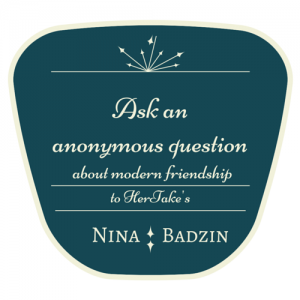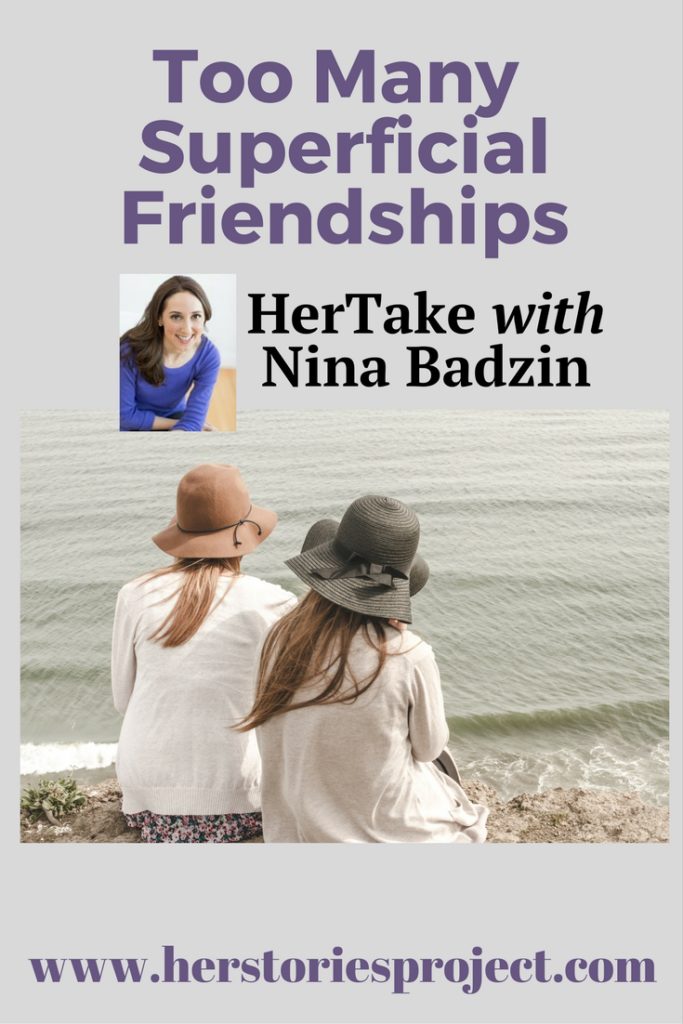HerTake: Struggling With Writer Envy
This month’s HerTake friendship question is all about envy. Can you relate to feeling jealous of a close friend’s success? Can you help our letter writer with your experience and advice?
Do you have a question for Nina? Use our anonymous form. You can read Nina’s answers to past questions here.
Dear Nina,
I’ve been blogging for three years. About 18 months ago I started submitting to larger websites and have been somewhat successful. My close friend started a blog recently, and while I want to help her, I’m jealous of the success she’s already achieved in a short time.
In high school we were inseparable. We were on the same sports team and competed in the same events. She was social and well-liked. I was (and still am) shy and difficult to get to know. She was a year behind me and ended up attending the same small liberal arts college. She introduced me to my husband because she had a major crush on him. (I only pursued the relationship with her blessing.)
Throughout our friendship, she has been one of the few people who I can really be myself with. She is loyal and supportive and makes me laugh. We can talk for hours and it feels like minutes. We live far apart and I miss her.
About a year ago, she began blogging when her mother was diagnosed with terminal cancer. Her mother’s illness was swift and brutal. After my friend’s first blog posted to her Facebook page, she texted me to say she’d had 500 page views. That’s more than I ever had on a single post in the three years since I’d been blogging. Her mother was dying of brain cancer and I was getting jealous of page views. I felt like a horrible friend.
My friend has now begun submitting to many of the same sites I submit to. She asked if I could share my “secrets” to getting published. I am reluctant and again feeling horrible about it.
I am reluctant because I’ve gotten where I am through hard work. There is no secret. It’s countless hours of researching sites and other writers and writing and revising and writing and revising and researching some more. It’s making yourself completely vulnerable and getting rejected. It’s about getting accepted but still not feeling very accomplished.
I am reluctant because I am jealous and petty and scared. I’m afraid she’ll be more successful. I’m afraid I’ll be watching her live out my dream. I’m jealous that she gets more likes and comments on her posts than I ever do. I don’t feel this way about other writers I don’t know. So why can’t I support my best friend?
I am working on my jealousy. (It’s the unflattering emotion I wrestle with far too often.) I’ve been reading a lot about Buddhism and looking inward. I feel better every time I let go and give more than I get. I know what the right thing to do is. I know there is enough for both of us, and for us all.
I guess what I want to know is, can you understand my reluctance? Or am I really just being a complete jerk about this? And why am I more threatened by her success than by complete strangers’ successes?
I’m feeling like the worst friend in the world.
Signed,
Struggling With Envy
Dear Struggling With Envy,
Your letter was admirably honest and probably more relatable than you suspect. One time when I was feeling especially envious about another writer, a wise relative told me that envy is like a wrecking ball destroying everything in its path. She helped me imagine the strength of envy ruining everything it touches then swinging back around to ruin the person who released it first. Your letter shows that you’re still on the safe side of the wrecking ball because you have mostly held back its potential to ruin your friendship. However, I do suspect that your friend has felt your hesitation to help so it’s time to decide how you’re going to handle her future requests.
In April I received a letter that reminded me of yours, but the issue was flipped. It was from a writer who felt supported and applauded by the bloggers she’d connected with online, but she felt discouraged and dismissed by a close friend of hers in town who is also a writer.
Many commenters told the April letter writer (let’s call her “April”) that her friend was flat-out jealous. I agreed, but I told April to forget about what was keeping her friend from applauding her work. Instead, April needed to focus solely on her own goals and her own writing because obsessing about her friend’s jealousy was getting in the way of her writing. Similarly, I believe that your focus on your friend’s success is getting in the way of your writing.
WHERE ENVY CAN BE USEFUL
In A Writer’s Guide To Persistence: How to Create a Lasting and Productive Writing Practice, author Jordan Rosenfeld dedicates an entire chapter to envy. She says, “Focusing on what others have is a form of procrastination and distraction from your own writing.” She suggests that when you’re feeling jealous of someone it helps to write down five steps it would take to get in a similar position to that person. We’re usually more jealous of the achievement than the person. I especially like her advice to reframe the envy into something useful. She writes, “Envy is a signpost pointing you toward what you really want.”
BUT WHAT DO YOU REALLY WANT?
It sounds like your friend’s writing motivation, for now, comes from her desire to share the tragic experience of losing her mother. Perhaps the writing process is helping her work through her grief. Perhaps she wants to help others who are experiencing the mourning process. Either way, I suspect that your friend’s success comes from the passion in her message as opposed to a clamoring for more likes and shares. I suspect that readers share her work because her story feels authentic and because her story helps others.
You said, “I’m afraid [my friend will be] living out my dream.” But then you mention that she gets more likes and comments than you do. I wonder if rather than envy about the likes and shares, you’re jealous of your friend’s underlying passion and clear motivation. Maybe it’s time to go back to the roots of your writing dreams. Were those roots based on likes, shares, and comments? I bet the dream did not start there. What do you enjoy and crave about writing as opposed to the publishing side of it all? If you can spend some time answering that question, you might point yourself in the right direction.
WHAT YOU ALREADY KNOW
Some of the advice I want to give you has already been covered by YOU in your letter. As you know, your friend’s success has nothing to do with you. She did not become a blogger to spite you, and her success has no bearing on your abilities or career trajectory. I know that you know this already as evidenced by your astute and self-aware analysis of the irrational worries that come into play with envy. As you said, there is enough for everyone. As you said, if you would help a stranger then you ought to help your best friend. And as you said, in life, the more you give, the more you get. (Usually.)
You know what you should do, but something is still holding you back.
DON’T BE ASHAMED
Before we delve further, I’d like to alleviate whatever shame you’re feeling about the jealousy. I will answer some of your direction questions, all of which seem to come with a layer of shame.
Can you understand my reluctance [to provide contact information for editors, etc.]? Yes, I can. You worked hard to get your writing published and on some level you feel that your friend should “climb the ladder” at the same pace or that she should not benefit so easily just because she knows you and can piggy back on your contacts. And by the way, you can feel reluctant, but do the right thing anyway. Both can be true at the same time.
Or am I really just being a complete jerk about this? No, not yet, but you’re tempted and that’s what I hope to help you avoid.
And why am I more threatened by her success than by complete strangers’ successes? That is something I would need more information to answer, and I do think it’s worth you exploring that question with someone who can help. My goal here is to influence how you treat your best friend more than how you personally feel about her success.
SHOULD WRITERS HELP OTHER WRITERS?
I think you should help your very close friend and even acquaintances. I agree with you that there are no major secrets to getting published and it’s mostly hard work. However, many of us do find help along the way so why not fall into the camp of someone who is helpful?
Rosenfeld similarly warns writers not to hoard information. She points out that most information is available when writers look hard enough or ask around enough. Your friends and acquaintances will either get it from you or from someone else, but they will certainly remember that you were unwilling to share what you know.
Rosenfeld asks readers to consider this: Can you honestly say that you didn’t learn some helpful tidbits from other writers here and there? Can you say that hearing about another writer’s experience didn’t somehow inform the way you pitched pieces? Were you never given the email address of an editor in the position to publish your work? Were you never pointed towards sites where writers like Erika Dreifus and Susan Maccarelli share tons of resources? (I have a section like that on my site.) Rosenfeld suggests that making a page like that on your site is a worthwhile exercise in generosity. Even if you don’t always feel like “we’re all in this together,” acting that way may eventually change your perception. Which brings me to . . .
BEHAVIOR OVER FEELINGS
So “Struggling with Envy,” while I might not be able to help you alleviate the envy you’re feeling, I hope that I’ve kept you from doing any damage to your friendship. It is so natural to feel jealous when success seems to come easily to the next person. (And I’m willing to bet that your friend’s success was not really “easy” considering the tragic nature of her writing material. You also noted that truth in your letter.)
Be gentle with yourself for feeling envious, but be vigilant about keeping yourself from acting on it. Nobody, including your friend, can blame you for feeling jealous. It’s what you do with the envy that matters.
Wishing you much success in your writing journey and many more years of a close relationship with your friend,
Nina





